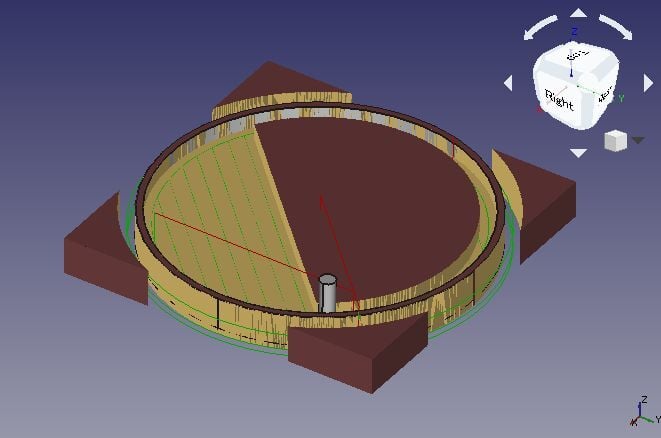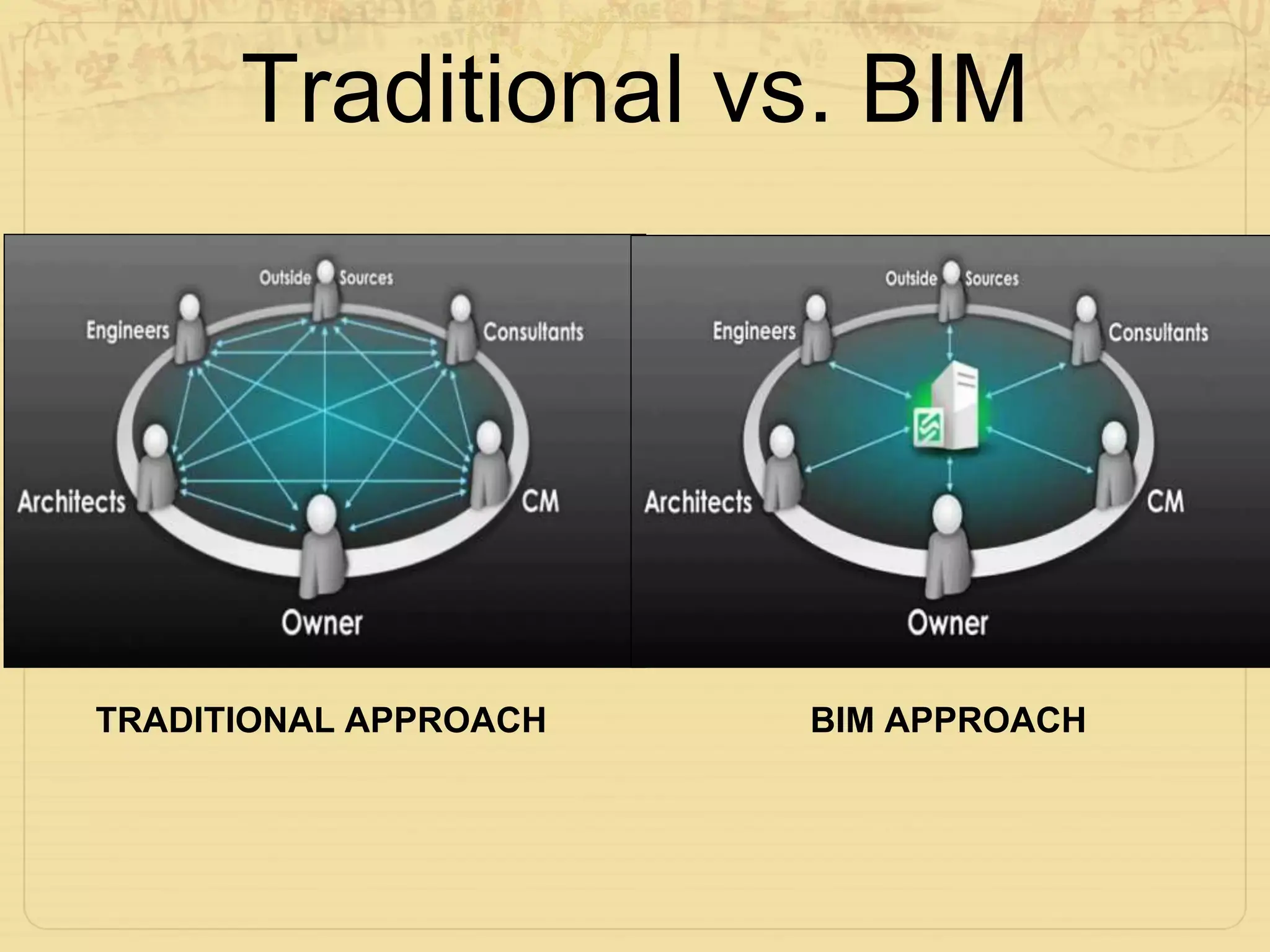
Architects have always shaped the built environment, but the architectural profession is evolving faster than ever before. Today, digital construction and information-driven workflows have created a new trajectory in the AEC industry: the rise of the BIM Architect. With growing demand for data-rich modeling, automation, and collaboration, BIM roles now offer higher compensation, faster career growth, and global job mobility compared to traditional architectural pathways.
This guide explores whether BIM is a good career path by comparing the roles, growth, and salary potential of architects vs BIM Architects. It explains how top BIM skills upgrade an architect’s workflow, outlines the complete BIM career ladder, and shows how to get started through top industry-relevant courses. Ideal for senior architects, fresh graduates, and AEC professionals seeking a high-paying, fast-growing, globally in-demand career path.
Is BIM a good career to pursue?
A common question from senior architects who are interested in a career change. Let us ask you this instead – do you still want to work in the architecture and construction industry but with better pay?
The ever-demanding needs for a better built environment has created a new demand for more efficient and optimised workflows through better collaboration and coordination. And so, BIM became the solution. A demand for BIM naturally means a demand for BIM-skilled professionals.
In this comparative guide, we will take you through the journeys of both an architect and a BIM specialist through their career and salary milestones.
How is the knowledge of BIM software a game changer for architects?
BIM software helps architects integrate intelligent 3D models, automate documentation, and coordinate multiple trades, making design delivery faster, more accurate, and more profitable.
With BIM software at their fingertips, architects can move beyond traditional 2D drafting methods to create intelligent 3D models that contain rich data and information about every aspect of a building's design and construction. This holistic approach allows them to explore design alternatives, analyse building performance, and visualize their projects with accuracy and detail. By leveraging the power of BIM software, architects can streamline the design process, minimise errors, and optimise building performance, ultimately delivering better-designed buildings that meet the needs of clients and occupants alike.
Furthermore, the knowledge of BIM enables architects to collaborate more effectively with other stakeholders throughout the project lifecycle. Additionally, BIM facilitates interdisciplinary coordination and communication by providing a common platform for architects, engineers, contractors, and owners to share information, resolve conflicts, and make informed decisions collaboratively. Architects can also integrate structural, mechanical, and electrical systems into their BIM models, allowing for real-time clash detection, performance analysis, and estimation.
Career Progression Of An Architect
After 3-5 years (depending on the country) of architecture school, the graduates will prepare to enter the workforce. The very first step into it will be a comparatively short stint – an internship. With the skills and experience from the internship, you can prepare to apply for a full-time position.
Skills and experience are best shown with an architectural portfolio.
Read more: 10 examples for your portfolio inspiration

1. Junior Architect
A junior architect or an architectural assistant supports the architect in design development. The main responsibilities are typically drafting, modelling, research and preparations for presentations and drawing submissions.
(Extra tidbit: in the U.K, there are Part 1 and Part 2 architectural assistants. Part 1 refers to an undergraduate or a RIBA part 1 graduate and Part 2 is a RIBA part 2 equivalent postgraduate)
Skills required:
- Good knowledge of Autocad, Sketchup and other 3D modelling software
- Proficient in architectural visualisation
- Good communication skills
- Knowledge of Autodesk Revit is a strong advantage
Junior Architect Salary: INR 17,000/mo
Accumulated years of experience: 0-3
2. Architect
The architect helms a design project from conceptualisation to production. He/she will develop design ideas, generate diagrams and models as well as all drawings. With the assistance of junior architects, the architect will prepare design presentations for clients and other stakeholders in addition to preparing drawing submissions to the authority. If you already have a substantial year of experience, you may be qualified for the senior architect position.
Skills required:
- Proficiency in 3D modelling, drafting and rendering
- Excellent skills in Revit, Sketchup, Autocad, 3ds Max, Vray, Lumion or Enscape, Rhino, Grasshopper and Dynamo
- Knowledge of digital image editing with Adobe suite applications or equivalent
- BIM skills are a plus
Architect Salary: INR 28,000-32,000/mo
Accumulated years of experience: 2-6
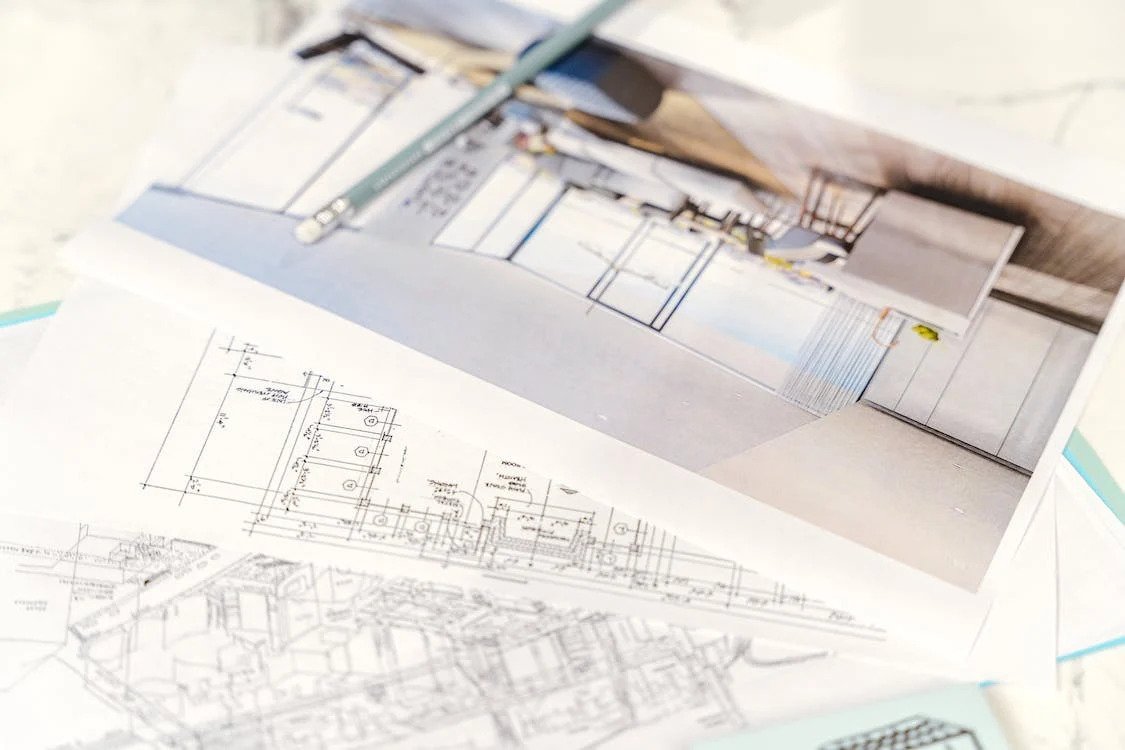
3. Project Architect
A project architect is a mid-senior role who supervises the project through design and construction stages. Responsible for ensuring zoning and by-laws compliance, the project architect will handle the project coordination and management. He/she will also take charge of ensuring the overall design intent is incorporated in documentation.
Skills required:
- Experience in project coordination and delivery
- Specialised knowledge in various building typologies
- Proficiency in Revit, Rhino, Dynamo, Grasshopper and other 3D modelling and rendering software
- Project management skills
Project Architect Salary: INR 55,000/mo
Accumulated years of experience: 5-8
4. Associate
The years of experience have made an associate an expert in all things design. In addition to overseeing the design process, they will also prepare detailed drawings as per requirements. They support multidisciplinary level, drawing, planning, developing and maintaining the project quality. In smaller firms, a project architect and an associate are more or less similar roles.
Skills required:
- Knowledge of construction systems and details
- Basic knowledge of engineering systems is a plus
- Ability to comprehend and interpret, building and zoning codes
- Proficiency in 3D modelling, rendering and project management software
Associate Salary: INR 65,000/mo
Accumulated years of experience: 8-15

5. Principal Architect
The Principal architect essentially manages the entire firm. He/she will focus on coordinating the entire project while also giving inputs for the design. Usually, the founder of the firm is also the principal. In large MNCs, there may be more than one principal architect.
Skills required:
Expertise in architectural design, construction systems and all relevant software
Management and leadership skills
Principal Salary: INR 100,000/mo
Accumulated years of experience: 20+ or self-employed
Career Progression Of A BIM Architect
1. Bim Modeller
A BIM modeller is typically the entry-level role in BIM careers. The role requires knowledge (and a degree) in architecture or engineering with 0-4 years of relevant experience. BIM modellers support the team with day-to-day BIM duties. The main responsibilities include, but are not limited to, BIM 3D modelling, technical drawings and assisting BIM architect/engineer/coordinator.
Skills required:
- Good knowledge of BIM software such as Revit, Archicad, Vectorworks etc
- Strong planning, coordination and time management skills
- Understanding of BIM models, Revit families and data management
- Additional skills such as parametric modelling using tools like Dynamo, Rhino.Inside, Grasshopper
BIM Modeller Salary: INR 25,000/mo
Accumulative years of experience: 0-4

2. Bim Architect/ Designer
This next level requires both knowledge and experience in BIM and their respective discipline (architecture, engineering etc). BIM architects play a central role in the BIM design team as subject matter experts. They will also be expected to train junior architects and BIM modellers on BIM and Revit workflows. An architect or an experienced draftsman can transition to a BIM architect with a good knowledge of BIM.
A BIM engineer is a similar role that follows this trajectory but in the engineering domain.
Skills required for Bim Architect/ Designer:
-
- Excellent modelling skills and proficiency in BIM tools
- Additional proficiency in Rhino, Grasshopper, Dynamo etc
- Skills in visualisation using Vray, Enscape, Twinmotion etc
Bim Architect/ Designer Salary: INR 35,000-50,000/mo
Accumulative years of experience: 2-6
3. Bim Coordinator
A BIM coordinator ensures a smooth coordination with the design disciplines and the BIM team. They will regularly interact with multiple stakeholders to coordinate BIM projects. A BIM coordinator is also responsible for organising BIM execution plans and documents as well as the quality check and control for BIM models.
Skills required for BIM Coordinator:
- Proficiency in Revit, Navisworks, Infraworks and other BIM and CAD software
- Understanding of Common Data Environment in BIM, IFC and other data exchange formats
- Ability to set up and coordinate BIM execution plan and workflows
- Relevant experience and qualifications in BIM is important
BIM Coordinator Salary: INR 80,000/mo
Accumulative years of experience: 5-10
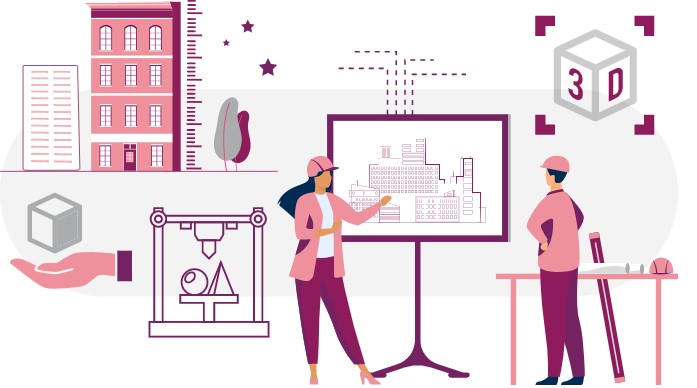
4. BIM Manager
After some years of experience as a BIM coordinator, you can become a BIM manager who will oversee the entire BIM project. BIM managers are responsible for setting up the LOD (Levels of Details or Development) and delegating tasks to the team while occasionally becoming advisors to the teams to resolve any issues.
Skills required for BIM Manager:- (Depending on the firm and the team) Expertise in large scale architecture, engineering and infrastructure structure projects
- knowledge and experience in executing design and construction projects using BIM
- Excellent understanding of BIM dimensions and LODs and their implementations
- Note that these are just common examples of skills for a BIM manager.
- Depending on the firm and scale of projects, he/she will require better expertise.
BIM Manager Salary: INR 150,000/mo
Accumulative years of experience: 10-15+
Read more: Carbon Negative Architecture: What It Is and How It Will Save Our Planet
5. Bim Director Or Head Of Bim Department
The most senior level in this career trajectory, this role runs the entire BIM department of the firm. They oversee all workflows to ensure the projects are aligned with execution plans and regulatory requirements. Many BIM managers and directors may go on to set up their own BIM firms.
Bim Director Or Head Of Bim Department Salary: INR 150,000-200,000/mo
Accumulative years of experience: 20+
Evidently, BIM professionals at every level earn better than the traditional architect roles. Many industry professionals are showing interest in BIM as it will allow them to stay in the architecture industry but with better pay.
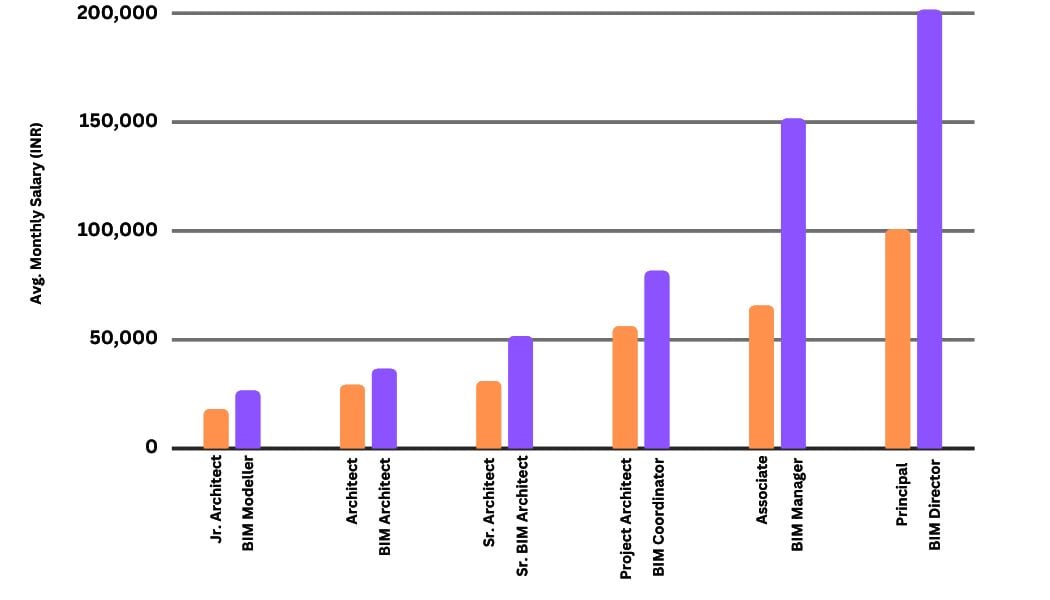
How Can You Start Your BIM Career?
It is not as difficult as many people think. First of all, you need technical knowledge. Many BIM specialists went on to senior roles without the over-the-top academic qualifications. There aren’t even many universities worldwide that offer BIM and they are also expensive.
The answer comes in shorter cohort-based courses. These courses will provide you with both theoretical and practical skills in BIM. Master the software and workflows to build an impressive portfolio
Top Courses to enrol for upskilling in BIM
In the journey of making a successful career in BIM, upskilling is an important stepping stone. Listed below are some of the top courses that you can enrol yourself in:
1. Novatr
Novatr offers a primal 9-month BIM Professional Course that features a specialised curriculum created by experts from firms like Cooper Carry, Arup, Schmidt Hammer Lassen, and more. This program elaborates BIM processes, cloud collaboration, visual programming, clash detection, and information management. Novatr paves the way for eager-to-learn professionals and helps them with hands-on experience and placement opportunities with renowned architecture firms.
2. BIMLabs
BIMLabs caters to aspiring AEC professionals by offering them a Building Information Modeling course that is tailored to smoothing out design processes. BIM tools assist in planning, construction, management of building projects, and ironing out communication challenges. BIMLabs also operate their offline training centre in Kerala, extending placement opportunities to participants after the course is through.
3. TechnoStruct Academy
TechnoStruct Academy provides BIM training courses in Building Information Modeling, along with training in software applications like NavisworksBIM, Revit, NavisWorks, and AutoCAD. TSA also functions as the training division of TechnoStruct LLC, a permanent Engineering and Technology BIM firm, established in the US.
Conclusion
To show you a bigger picture, BIM has emerged as one of the promising technologies that is going to revolutionise the AEC industry. With the rising demand of BIM technology, pursuing a career as a BIM professional is becoming aspirational! So why do you have to miss out? The BIM Professional Course from Novatr delivers an industry-relevant curriculum, prepared by BIM experts from top AEC firms. The course focuses on practical application of BIM through industry workflows, allowing the learners to master it in just 9 months. The learners will also work on a RIBA-structured capstone project to practise their skills with the guidance of the mentors. At the end of the course, they will work on portfolio preparation and be supported with job placement.
Master BIM and enjoy better opportunities and remuneration in your career. For more information on BIM career paths, check out some more blogs on our Resources.
FAQs
1. What is the difference between an Architect and a BIM Architect?
An Architect focuses on building design, drawings, and spatial concepts, while a BIM Architect creates data-rich 3D models, automates documentation, and coordinates structure, MEP, and construction workflows using BIM tools like Revit.
2. Is BIM Architect a good career?
Yes, a BIM Architect earns higher salaries and enjoys faster growth than a traditional architect because BIM expertise is now required for digital construction, large-scale projects, and government-mandated workflows.
3. What does a BIM Architect do?
A BIM Architect designs and manages intelligent building models that integrate structure, systems, materials, and schedules, enabling clash detection, accurate drawings, and real-time project coordination.
4. What is the salary of a BIM Architect?
In India, BIM Architects typically earn between INR 35,000 and INR 200,000 per month, depending on experience and role, from BIM Modeller to BIM Manager or BIM Director.
5. Is BIM better than CAD?
Yes, CAD creates drawings, but BIM creates intelligent models that automate updates, simulate design changes, and coordinate multiple disciplines throughout the entire building lifecycle.
Was this content helpful to you








.png)
